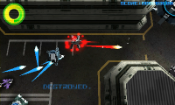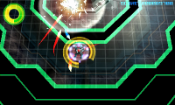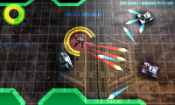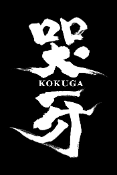damn, you're killing it with the reviews lately!
Kokuga Review
|
|
See PixlBit's Review Policies

On 08/16/2013 at 12:00 PM by Nick DiMola A unique take on the shoot-‘em-up genre with mixed results. |

For veterans of the shoot-‘em-up genre looking for something original.
Kokuga isn’t your typical shoot-‘em-up. Despite being developed by Ikaruga alums, it takes a unique approach to the genre that encourages a more defensive playstyle and completely turns the conventions for power-ups on its ear. Though an interesting divergence, the changes made aren’t necessarily for the better.

Like many other games in the genre, Kokuga offers an extremely thin story that can end in multiple ways depending on what path you take through the game’s many levels. If you’re playing Kokuga, you’re in it for the gameplay, not the “rich” narrative - like most shoot-‘em-ups. The scrolling landscape - standard for this sort of game - isn’t the basis for Kokuga; it’s instead set in a 2D arena that players can freely move about with their vessel. In Kokuga, running away from a confrontation is a totally viable strategy due to the way the levels are laid out. You’re encouraged to creep along and take out enemies before they catch sight of you. Stationed throughout the arena are enemy turrets, tanks, and other projectile-spawning units. Each unit poses a different threat to your well-being. The more mild-mannered enemies will simply fire in a given direction at a timed interval, while some of the more imposing enemies will dodge your fire or shoot homing missiles at you.
In and of itself, none of these enemies are horribly threatening, but when they congregate in small groups of three to five, things can get a little dicey. Your craft is capable of shooting in 360 degrees, but to do so, you need to shift your turret around using the L and R triggers. Moving the turret is obnoxiously slow and its lack of swiftness is often the greatest threat to your safety. Dispensing of moving enemies can be quite challenging because you need to time both their movement and trajectory with the movement time of your turret. Perhaps by design, the slow controls make for one of the game’s greatest challenges. Had the developer, G.Rev, included touch screen aiming, this would be a different game completely. As it stands, the control scheme is quite frustrating because you feel like you’re always a step behind.

To bridge the huge gap left by the less than desirable controls, players are provided with twenty power-up cards that are randomly generated each pass through the level. These have a variety of effects, from replenishing health, to providing a double shot, to applying a shield or invisibility. One card even turns your weapon into a death ray laser that obliterates enemies. At any given time you have four cards to work with, so you’ll have to manage them appropriately. This may mean using up a bunch to (hopefully) draw a health restoration card when you’re in a pinch or it may mean holding onto a laser weaponry card till you reach the boss, freezing one of your open card choices.
The card system certainly changes the game in a meaningful way and it took me a long time to get accustomed to using them effectively. I eventually learned (by losing over and over) that it’s necessary to focus on the cards during the missions. The card system does allow for you to build a certain strategy based on which ones you have available and it forces you to make strategic decisions based on your knowledge of the level and your current situation.

Kokuga is a very tough game. Yes, you can run away. Yes, you have a set of power-up cards on you at all times. But the odds are almost always stacked against you due to the slowness of your ship and the turret that sits upon it. Furthermore, your health doesn’t automatically refill, and you only have one life to make it through each level, plus the boss encounter that follows. If you take the harder tracks to the alternate endings, some of the levels are long and completely overwhelming. And that’s on the Normal settings. There are more challenging settings that seem to only limit your life further, but this just makes the tough situations that much tougher.
While I was able to overcome many of the levels in Kokuga, it was never easy and many times, it wasn’t fun either. Quite frankly, I still don’t know how to feel about the game. It’s not a bad or poorly designed game, but the pacing and control suck most of the energy out of the experience. Grinding through a particularly long and challenging level only to die at the boss and be forced to play it again quickly becomes a deterrent. I found this to be at odds with how games in the genre typically play out.
Kokuga does provide a spin on the genre that hasn’t been done before and that’s commendable. I’m not so sure I like it better than any other shoot-‘em-up I’ve played, but if you’re a veteran of this genre and you’re itching for something new, Kokuga just might be your jam. Everyone else is going to be in for a very rough ride and sticking to a more traditional twin-stick shooter is definitely a better choice.









Comments